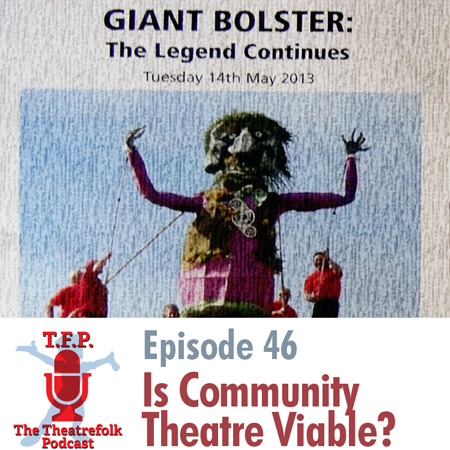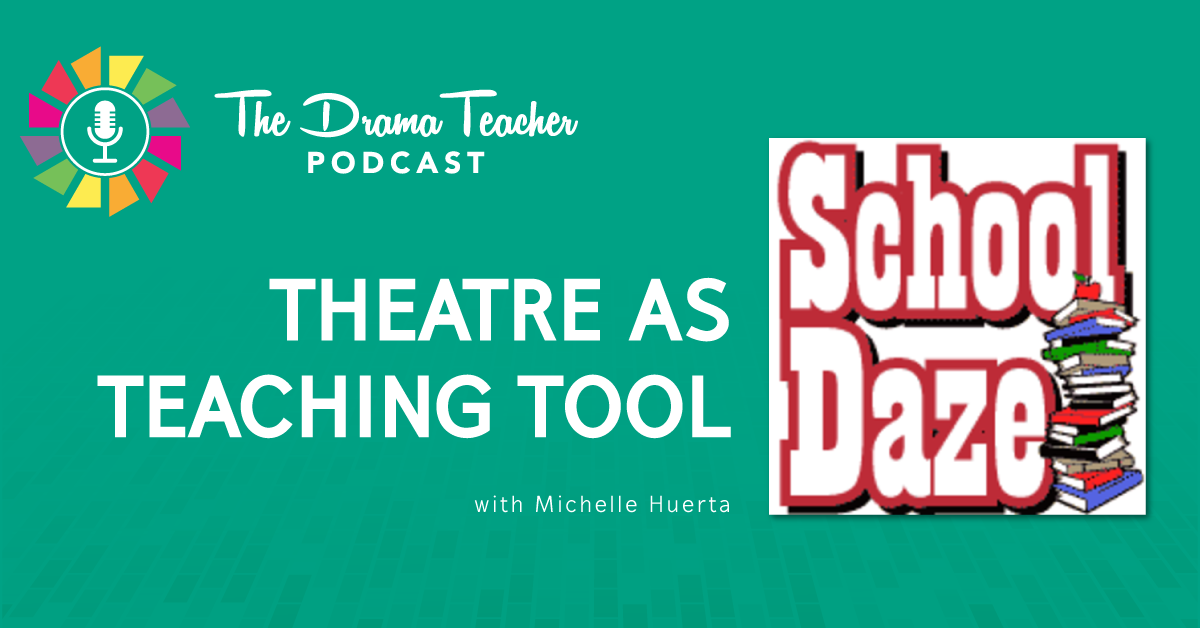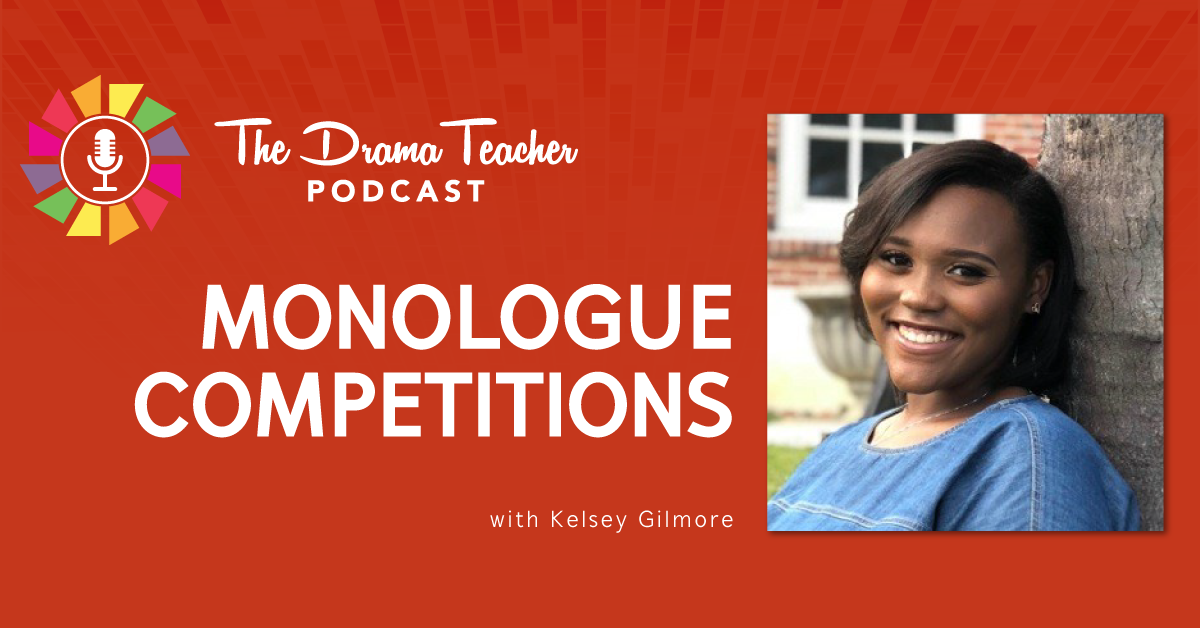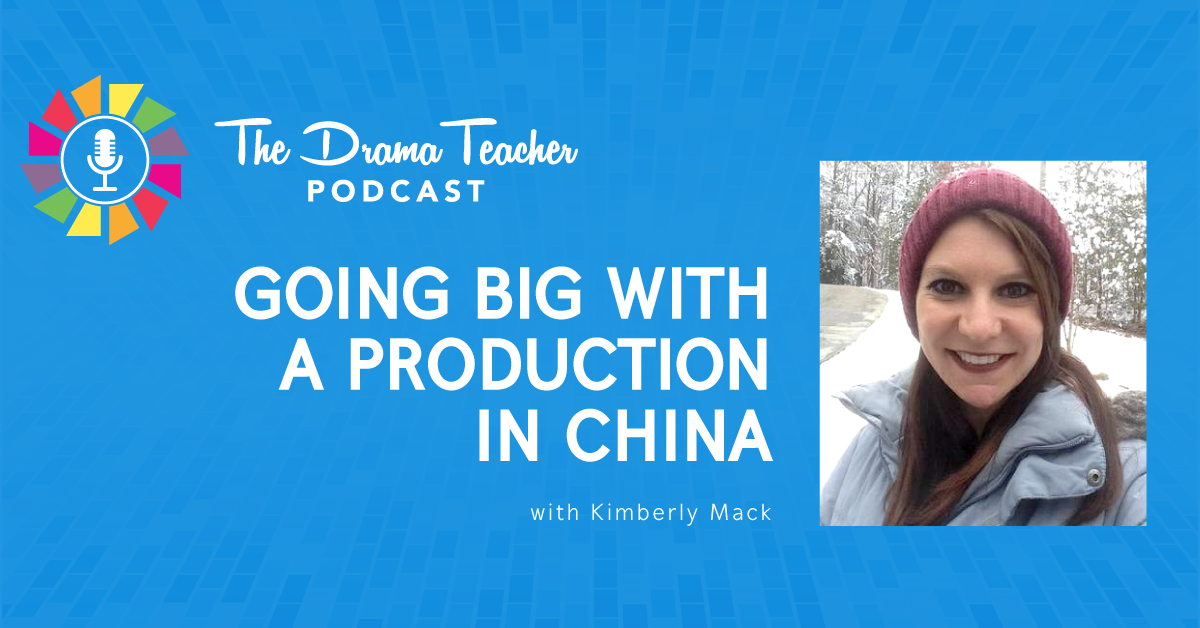Is Community Theatre Viable?
Episode 46: Is Community Theatre Viable?
This podcast continues a series of talks between Lindsay and Craig on the plays they saw during their trip to England. This week they talk about a true community project between young and old, music, dance and theatre, all on the Cornish legend of the Giant Bolster.
Show Notes
Subscribe to The Theatrefolk Podcast
Episode Transcript
Welcome to TFP, The Theatrefolk Podcast. I am Lindsay Price, resident playwright for Theatrefolk.
Hello! I hope you’re well. Thanks for listening.
Today, Craig and I continue our conversation on the shows we saw in England and a totally unique theatrical experience. But first, let’s do some THEATREFOLK NEWS.
So, next week, from June 25th to the 29th, Craig and I are going to be at the International Thespian Festival in Lincoln, Nebraska. We’ve been going to this festival with Theatrefolk since 2004 which means, what nine years? Ten years? Oh, isn’t that a long time? And that’s not actually counting the three years in the 90s that Craig and I were workshop leaders at the festival before Theatrefolk even existed!
The International Thespian Festival is a pretty amazing experience for any high school student. Your days are jam-packed with huge shows that had to be adjudicated to make it to the main stage. I once saw a production of Jesus Christ Superstar with eight follow spots and the very, very first year that Craig and I went, we saw a production of The Pirates of Penzance that had a life-sized pirate ship with pirates, with singing, with cannons going. It was just amazing.
And then, on top of that, you can fill your afternoons with one-acts, there are three hours of workshops every afternoon in every possible theatrical field you can imagine. I teach playwrighting there and I love it because the students who come to my class want to be there – they love theatre, they want to write, and it’s fun to teach people who want to be there, and who love theatre, and who have a passion for theatre.
And also, it’s like a one-stop shop. You can talk to people from different universities, you can buy plays. It’s a total immersion into theatre world. It’s a really wonderful week. And the real reason I’m going on about it is that we here at Theatrefolk headquarters, we have a little secret that we are going to be doing next week. We’re going to have a secret daily password while we’re at the festival and, if you come up to our table and you tell us the daily password, you get a free play. I know! Isn’t that exciting? And the plays we’re giving away, they’re all brand new, they’re all fresh off the presses – none of them are in our catalogue yet. And so, how do you find out about this password you’re asking? How can I get myself a free new play? Well, it’s going to be posted daily on the Theatrefolk Facebook page. So, if you haven’t become a fan or liked Theatrefolk on Facebook and you’re going to be in Lincoln, now would be a great time to check us out. And joining us up on Facebook is a good thing to do anyway because we do lots of free stuff over there. We’re coming up to the end of the month which is Free Play Sunday which is also posted on our Facebook page.
Lastly, where, oh, where can you find this podcast? We post new episodes every Wednesday at theatrefolk.com, on that Facebook page and on Twitter. You can find us on the Stitcher app AND you can subscribe to TFP on iTunes. All you have to do is search on the word “Theatrefolk.”
Episode Forty-Six: Is Community Theatre Viable?
And I’m not really talking here about what we know as community theatre which has been sort of been co-opted to mean amateur. I’m talking about what I think the true sense of the word is which is to bring a group of people together, to bring a community together to make art. And that’s the show we’re talking about today. It’s a show we saw when we were in Cornwall in Truro. It’s about a Cornwall legend, Giant Bolster. It was really one of the most unique and joyful, interesting community pieces of artistic works I have ever seen. And it was a total one-off. We just happened to be there for the night. We were lucky enough to have this experience.
That’s another thing that I think theatre truly is, you know? It’s that one time that you’re in the theatre where something, hopefully, magical happens. So, let’s get to it.
Lindsay: We have been in Cornwall for three days and it’s been absolutely lovely, hasn’t it?
Craig: I love Cornwall and I don’t think I’m ever going to weigh the same after having been here.
Lindsay: So, today, we are talking about… I would call what we say last night a singular experience, right?
Craig: Yeah, it was a one-off show that has never happened before and you will never see again.
Lindsay: Never again and will never see, I don’t think you’d see it in, we’d never see the likes of it in North America.
Craig: North America, I don’t think so.
Lindsay: So, what we saw is a program called Giant Bolster: The Legend Continues. Giant Bolster is a Cornish myth and it is about a guy who is, basically, a mean giant.
Craig: Yeah, he would be like the mean version of Paul Bunyan.
Lindsay: Yeah, that’s a good comparison.
Craig: Like, every place has like these bogeymen type legends, you know?
Lindsay: Ogres.
Craig: And this particular one, he was known for…
Lindsay: Beating cows.
Craig: …beating the farmers’ cows, eating children at random, and he basically was terrorizing the town.
Lindsay: And he had a wife who seemed to be doomed, the puppet version of her had this humongous rock that she sort of seemed to be her burden to bear.
Craig: Yeah.
Lindsay: It was a physicalization of her burden to bear. And so, this guy, he falls in love with a maiden…
Craig: Named Agnes.
Lindsay: …named Agnes and we were actually in, I think she becomes a saint.
Craig: Yes, she’s Saint Agnes.
Lindsay: She’s Saint Agnes.
Craig: Yes.
Lindsay: So, he falls in love with her, and the town tries to get rid of this ogre, and the town fails, and a knight is brought in, and the knight fails, and finally, it’s this girl who…
Craig: He falls in love with.
Lindsay: …who he falls in love with, and she gives him a task and this task is quite gruesome and he ends up dying.
Craig: Yes. Well, we can say what the task is.
Lindsay: Oh, sure! I was going to.
Craig: Oh, okay.
Lindsay: Okay. So, the task is that she asks him to fill a hole with his blood, and what Bolster doesn’t know is that there is a leak in the hole in the rock, I guess, it’s a hole in the rock.
Craig: I imagine that the whole legend is based around that particular rock formation.
Lindsay: Yeah.
Craig: Like, I think it’s probably a real place.
Lindsay: Probably. Anyway, and he bleeds out and everybody is happy because the town is free. Okay. So, that’s the legend, and what we saw was a whole education experience. This was a community experience. This was dance, opera…
Craig: Ballet, yeah. See, we had no idea what we were booking into when we got the tickets for this, months ago. It was described as like a theatre-ballet-opera based on a local legend so we thought…
Lindsay: We’re in!
Craig: We’re in, and we knew it was a community project but we had no idea what we were getting. And, I think, even as we went in, we weren’t even sure how long we would stay because who knows what was going to happen.
Lindsay: So, the first thing that we’d seen when we walked in, first of all, it’s a lovely little theatre and it is a really good turnout. It is really a representation of a community. It was young – young kids, all the way up to grandparents, and because there were schools involved, I’m sure a lot of them were…
Craig: Parents, moms and dad, aunts and uncles.
Lindsay: …parents and families. But, so what? A really good turnout.
Craig: Yeah, and there was all social-economic, too.
Lindsay: Yeah.
Craig: Like, you know, rich, poor, old, young. It was a true community experience.
Lindsay: So, the first thing that happened was an overture. The concert Cornish Sinfonia played something called “The Mousehole Cat Overture” and there is a fishing village in Cornwall…
Craig: Called Mousehole.
Lindsay: …called Mousehole. And what did you think about the overture, Craig?
Craig: I loved it. Well, actually, what I thought – see, we didn’t read the programme before it started – I thought we were just seeing an overture to the play we were about to see. But I thought it was absolutely beautiful. The orchestra was incredibly talented. This is a community, I think.
Lindsay: I think so, too.
Craig: Yeah, it’s not like a big professional big-city orchestra.
Lindsay: No.
Craig: And they were just beautiful performers and it was just a lovely… For me, it encapsulated in music all that I felt as we travelled throughout Cornwall.
Lindsay: Yeah.
Craig: You know, the dramatic vistas, the quiet fields.
Lindsay: The sweetness, sweet people. It’s rugged, and it’s basic – and I mean that as a compliment. I mean that as it’s not fussy or pretentious. You’re right. It was, in music, exactly what we’ve seen.
Craig: I think so.
Lindsay: So then, the next bit was a community education project and what happened was that there were a number of schools. They were from one, two, three, four different primary schools and I’m going to say that the age ranges from, say, seven to ten.
Craig: Something like that.
Lindsay: And each school was given the myth, the legend of the Giant Bolster. They had to use that as their base. And then, they each were given the same question, “How can music help to convey, invoke a sense of atmosphere or define a character?”
Craig: Okay, this part was amazing.
Lindsay: It was really everything that we believe theatre should be.
Craig: It was, basically, four different character sketches.
Lindsay: Yeah.
Craig: Like, almost like tone poems on the theme of the Giant Bolster legend. They weren’t really necessarily like a full narrative with beginning, middle, and end. They were like little, how would you describe them?
Lindsay: Moments.
Craig: Yeah, moments brought to life on stage…
Lindsay: Brought to life in movement.
Craig: …with music and movement.
Lindsay: Music, and movement, and text. And I have to say, I loved that they went this way and that there was a lot of abstractness. I think that a lot of the issues that elementary theatre has is that it tries so hard to be narrative, and there’s a narrator, and we’re going to tell you a story, and we’re going to follow along the story. Well, what if it wasn’t? What if you went in the total opposite direction and you were abstract and you just tried to paint pictures with words or with music?
Craig: Yeah, yeah, there’s a lot of tableau work. There was a lot of, you know, sound. There was…
Lindsay: And was very clear. These were not schools for the arts. These were – they looked like – regular kids.
Craig: Yeah.
Lindsay: And they moved like regular kids do.
Craig: Yeah, they weren’t all theatre school trained kids.
Lindsay: Or it wasn’t polished.
Craig: Everyone was looking into the audience to see where mom was.
Lindsay: But I’ll tell you this for nothing. The other thing I really enjoyed about this is it was very clear and I don’t know if it was that’s just the way they are, or I don’t know if this is the way that the teachers taught this particular section, but it was very clearly student-leader driven. A lot of the stuff had groups. In each group, there was a clear student-leader, and the teachers, they stayed off to the side.
Craig: There was no coaching from the teachers.
Lindsay: There was no coaching. There was nothing. And, if a mistake went on – as it did in more than one occasion, something went awry – it was the student who, they rallied around each other, they looked to each other, and the teacher did not step in and try and solve the problem.
Craig: Yeah, that was fascinating.
Lindsay: As a lover of theatre, I just love that that happened and then…
Craig: And that the adults let it happen, too.
Lindsay: …and it was its own organic thing. It wasn’t perfect, but my goodness, it was perfect.
Craig: I loved it.
Lindsay: And the other thing that I think was really interesting was then, add to that though, I mean, these are seven to ten-year-olds, it was very clear that, in some places, there was a very strong musical cue that they all had to follow. There was one section where, I think in this case it was a teacher that, in the movement section, every time she hit a beat on the drum, they knew…
Craig: They knew what they were supposed to do.
Lindsay: They were supposed to go to the next thing and I quite liked that.
Craig: Yeah.
Lindsay: I thought that was a really, instead of narration, I just find it was very inspiring, actually, this little bit and, you know, made me think about how can we do something at the…
Craig: The primary level?
Lindsay: No, we don’t really go into the primary level, but at the middle school level, that is abstract and based on how do we do a character sketch but then let them do all the work? It was really inspiring. It was a…
Craig: I was crying.
Lindsay: It was just an absolutely wonderful project. It was a wonderful project and I’m so glad that we were here at this point in time because, yeah, it was just by luck that we were here on this day, that we were able to attend.
Craig: And that was Act One.
Lindsay: And that was just Act One.
Craig: Act Two was more of a narrative. Actually, it started with sort of a, like, a pageant parade…
Lindsay: Yes.
Craig: …that, I think, there is place called Saint Agnes and they put on a pageant festival every year…
Lindsay: Yes.
Craig: …using large, oversized puppets.
Lindsay: We’ll put the picture.
Craig: If you’re North American, it’s like bread-and-circus type theatre.
Lindsay: Yes, that’s exactly it.
Craig: So, they paraded those characters across the stage. But then, there was…
Lindsay: In fact, Craig, they’re called the Saint Agnes Pageant Puppets.
Craig: There you go.
Lindsay: There you go.
Craig: And then, after that, there was a show that was a little more narrative-based. But it was also community-driven and it encompassed performers from, there were a few of the young kids that were in it, like the seven-year-old, all the way up to, like, senior citizens.
Lindsay: Yeah, well, yeah, very much community-driven. So, there were who was involved with that and also, it was obviously a project within all different media because we had the Cornish Sinfonia because they did the interpretation.
Craig: There’s the opera.
Lindsay: The New Cornwall Opera Soloists and Chorus which had, I think, it was new music…
Craig: Oh, yeah, for sure.
Lindsay: …on the myth, on the legend of the Giant Bolster, and then, a place called the Duchy Ballet. So, we’re telling this story, and then, there was also a narrator but only in the briefest sense. He was just basically setting up each section.
Craig: Yeah, he was there just to move us to the next piece.
Lindsay: And then, this story was told with dance and opera.
Craig: It was really neat how the opera was done, too. So, the orchestra was on-stage right, the choristers were up-stage left, and then, the performers were in the front of the stage. So, the singers, they stayed where they were and they sung the roles of the show. But then, downstage, the actual characters were dancing and, basically, miming what they were doing in their scenes. I thought that was a neat way of incorporating opera and dance.
Lindsay: Yeah, just sort of melding it all together, and very enjoyable.
Craig: Oh, yeah. I loved it.
Lindsay: It was a really… When I think about, you know, when we think about some of the other theatre that we’ve seen, all the theatre that we’ve seen has been inherently British, I think – from the comedy of that Tommy…
Craig: Yeah, Being Tommy Cooper.
Lindsay: …to the farce that we saw. But this was a singular experience. It’s come and gone. It’s over. But I love that we were able to see something based on a local legend, to see something that was done that was community-driven and that really had an education bend to it that was, again, very quite inspiring.
Craig: And, for me, it was a summary of everything that the roots of theatre really are which is a community of people gathering to share a story.
Lindsay: Yeah.
Craig: And that, sometimes, well, I sometimes forget that, for sure, that that’s really what the root of it all is.
Lindsay: Well, you get to this notion of that perfect performance. Everything’s got to be perfect and it sometimes gets a bit robotic and cold.
Craig: Yeah, and there’s a lot of community theatre, too, that’s really just trying to reproduce some other show that’s not really their story and this really brought home to me what community theatre and regional theatre really is and should be about.
Lindsay: And, there’s some community theatre that you see that just miss the mark and it’s really a lack of… It comes across as lazy, whereas this, when mistakes were made, it just really showed how much of a community these groups were because it wasn’t laziness. Oh! They were just trying so hard to work together.
Craig: You’re right, is that it?
Lindsay: I think that’s it.
Craig: That was the Giant Bolster: The Legend Continues – a show you will never see.
Lindsay: A show you will never see. But what I hope that you’re getting from this is just really, you know, sometimes, we need to step away from narrative and, sometimes, that we – particularly those of us who work in education – we need to let whatever happens on stage happen, and let the students figure it out for themselves, and let them work together to figure it out for themselves, and maybe we need to be a little less robotic, perfect, and a little bit more just letting the moment happen on stage because that’s what theatre is, too.
Craig: Yeah.
Lindsay: Letting the moment happen.
Craig: Yeah, that’s theatre. It’s moments to moments to moments.
Music credit: “Ave” by Alex (feat. Morusque) is licensed under a Creative Commons license.



